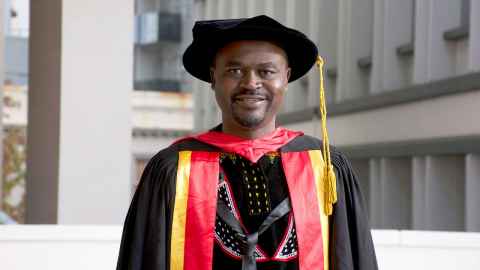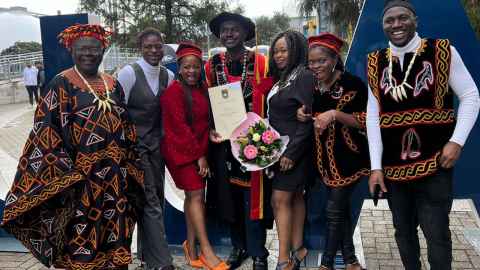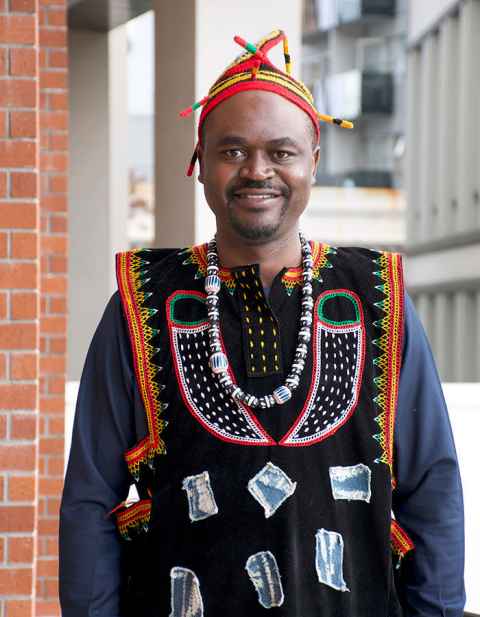Standing up for what’s right: Bernard Sama
9 May 2024
From a prison in Southern Cameroon to Auckland’s Spark Arena, University of Auckland PhD graduate Bernard Sama has travelled a long way to reach this moment.

Languishing in a Cameroonian prison, Bernard Sama could never have imagined he’d end up graduating with a PhD in New Zealand.
The lawyer, asylum seeker advocate and father-of-three crossed the stage at Spark Arena to get his doctorate in social work as part of the University of Auckland’s autumn graduation on Monday 6 May.
Bernard’s PhD thesis focuses on improving health and well-being in New Zealand refugee law and legal processes, something he’s particularly qualified to write about after arriving here himself as an asylum seeker in 2006.
Originally from the anglophone region of Cameroon, a place that, being rich in crude oil and other natural resources, he says, “has led to a very difficult history of perpetual colonisation of our people”.
Growing up with his family of seven siblings in a village community, he says, Southern Cameroonians have been “marginalised, oppressed and exploited as a minority people in Cameroon for over 63 years; since joining East Cameroon [Cameroonians from the French region who make up 80 percent of the country] to form what is now known as Cameroon".
“Anyone who raises their voice saying, ‘We’re frustrated with the current arrangement with East Cameroon, and we want self-determination and autonomy for the region’ is tagged by government loyalists as a separatist, and targeted.
“We’ve had one of the worst, most silent and lethal authoritarian dictators in Africa for over 42 years now as president, who has a strong military and police force."
Bernard says the government crackdowns on fundamental human rights like freedom of expression, assembly and self-determination for all Cameroonians, and those from the south in particular, largely go unnoticed by the rest of the world.

To make a complicated history short, says Bernard, less than a decade after joining East Cameroon in 1961, the Southern Cameroonians “were overrun and dominated by the francophone government, with little effectively run government or police and no military might”.
One advantage of the current government in the Cameroons, however, says Bernard, is its focus on making education accessible to most, which he and millions of others have benefited from, allowing many to get a university education to at least undergraduate level.
Bernard studied law at the University of Buea, where all courses were taught in English, rather than the ubiquitous French. As well as English, he also speaks a native dialect, Ngamambo, and Cameroonian Pidgin English (Cameroonian Creole).
He chose law, he says, because of an overriding feeling of disgruntlement among community elders when he was growing up.
“They felt we’d been manipulated by the United Nations, as engineered by Britain and France, into joining French Cameroon. This led to a strong movement for self-determination among Southern Cameroonians as epitomised by the slogan: “The force of argument not the argument of force,” which attracted many young people like me to the struggle.
“We believed that by studying law, we could someday change things through legal and political means.”
But it wasn’t to be, and since 2016, things have now escalated into a full-blown armed conflict between Cameroon Armed Forces and Ambazonian separatist groups, with thousands killed, villages burnt, and hundreds of thousands displaced internally and externally, mostly as a result of reprisal measures by Cameroonian Armed Forces, says Bernard.
This motivated me to investigate how the law that governs refugee status in New Zealand can work better for people like me, who have often come from backgrounds which include torture and detention.
After completing his degree in 2003 and working in human rights law, monitoring human rights violations against villagers living alongside a controversial 1000km Chad-Cameroon oil pipeline project, Bernard started helping people whose cases were critical, and who had no other form of legal support.
“The criminal justice system in Cameroon is a sham, used by the government to silence human rights activists, Southern Cameroonian advocates, and other dissenting voices,” he says.
“Citizens are arrested and detained arbitrarily for alleged crimes, tortured and held under inhumane conditions for months or years, either without trial, or after a sham trial."
Bernard was to experience this himself when he was arrested under suspicion of insurgent activities in 2005, spending six months in prison wondering what would become of him.
“Prison in Cameroon is a horrible place. There is psychological torture from the environment itself and physical torture by guards and other inmates. The government barely provides basic food, and the rest is on the prisoners to fend for themselves through family and other connections. Even the toughest criminal would never want to go back!”
Thanks to interventions by charitable organisations, however, Bernard was eventually released, and arrangements were made for him to move to a safe country.
“When I applied for asylum in New Zealand, which I knew very little about, it was a relatively fast process, about four months altogether, compared to many cases that take much longer, so I was lucky. I started off living in Hamilton, which will always feel like home for me as my first experience of New Zealand.”
At first, he says, despite people mostly being kind and welcoming, he was a fish out of water.
“I was lost and confused.”

But he soon found his feet, enrolled in a postgraduate diploma focusing on mental health and addiction, and then completed a masters in health sciences at AUT, focusing on the coping strategies of asylum seekers.
As result of receiving First Class Honours, he won a doctoral scholarship to Auckland, where he completed his thesis, looking at New Zealand refugee law and how it determines who’s a legitimate asylum seeker, and how it can be improved from a wellbeing point of view.
“Even as a lawyer, my own experience of being an asylum seeker here was quite challenging. It was extremely stressful navigating and understanding refugee law. I also felt distressed by the legal processes involved in determining my refugee status.”
During this time, he also helped several other asylum seekers who had similar experiences coping with the process.
“This motivated me to investigate how the law that governs refugee status in New Zealand can work better for people like me, who have often come from backgrounds which include torture and detention.”
His thesis, supervised by Professor Jay Marlowe (Education and Social Work) and Dr Anna Hood (Law), looked at this issue from a legal, psychological, and social work perspective, and has already resulted in notable improvements under the previous government.
These include contributing to ending, in practice, but not yet in law, of automatically putting asylum seekers in police cells and prisons on arrival in the country.
Thanks to his and many other advocates’ efforts, the government also now offers asylum seekers two years of welfare support, after ending this practice 32 years ago.
Another important change advocates achieved was getting the government to include successful asylum seekers (called Convention Refugees) into a key policy document, the New Zealand Refugee Resettlement Strategy (2022/2023).
Not content with all of this, Bernard’s next goal is to get postdoctoral funding to look at the best ways of operating the legal system to be sensitive to the wellbeing of already traumatised people seeking refuge; as well as pushing for law reform on detention seekers who arrive in groups of more than 30, who under current law, would automatically be detained.
Meanwhile, he, his partner, three daughters – the oldest of whom has just started a degree in social work at Auckland – and brother, who all eventually joined him in New Zealand from Cameroon, and his elderly father, who has travelled especially from his home in the US to be at graduation, will be celebrating a proud and happy day.
“I feel really excited to have come to this point and completed my thesis, but there’s always more work to do,” says Bernard.
Media contact
Julianne Evans | Media adviser
M: 027 562 5868
E: julianne.evans@auckland.ac.nz